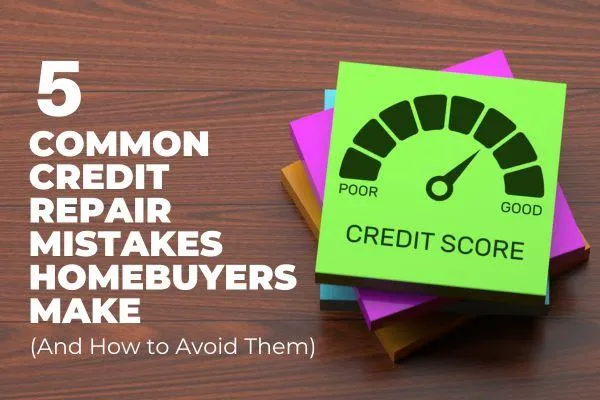Blog

5 Common Credit Repair Mistakes Homebuyers Make (And How to Avoid Them)
Step right into our guide on the common credit repair mistakes made by homebuyers and how to steer clear of them. Credit repair plays a crucial role in the homebuying process, and avoiding these mistakes can make all the difference in securing your dream home. In this article, we’ll delve into five common pitfalls that homebuyers often encounter on their credit repair journey and provide actionable tips to help you avoid them.
Mistake 1: Neglecting to Check Credit Reports Regularly

Regularly monitoring your credit reports is paramount in the credit repair process. Many homebuyers make the mistake of overlooking this crucial step, only to discover errors or inaccuracies when it’s too late. By checking your credit reports regularly, you can catch any discrepancies early on and take steps to rectify them. Make it a habit to review your credit reports from all three major credit bureaus – Equifax, Experian, and TransUnion – at least once a year, if not more frequently. This proactive approach can help you identify and address any issues before they derail your homebuying plans.
Mistake 2: Disregarding Credit Utilization Ratios
Your credit utilization ratio, which measures the amount of credit you’re using compared to your total available credit, plays a significant role in your credit score. Homebuyers often make the mistake of disregarding this factor, which can have a negative impact on their credit repair efforts. To avoid this pitfall, aim to keep your credit utilization ratio below 30%. This means using no more than 30% of your available credit at any given time. By keeping your credit utilization low, you demonstrate responsible credit management to lenders, which can boost your credit score over time.
Mistake 3: Closing Old Accounts
Closing old accounts may seem like a good idea when trying to streamline your finances, but it can actually harm your credit score. This is because closing old accounts reduces your overall available credit, which can increase your credit utilization ratio and shorten your credit history – both of which can lower your credit score. Instead of closing old accounts, consider keeping them open and using them sparingly to maintain a healthy credit mix and lengthen your credit history. By keeping old accounts active, you can preserve your credit score and avoid setbacks in your credit repair journey.
Mistake 4: Failing to Communicate with Creditors
Communication is key in the credit repair process, yet many homebuyers fail to engage with their creditors effectively. Whether you’re disputing a charge, negotiating a payment plan, or seeking assistance with a financial hardship, it’s essential to communicate openly and honestly with your creditors. Ignoring communication from creditors can lead to missed opportunities for resolving issues and improving your credit score. Instead, make it a priority to respond to all communications promptly and professionally. By maintaining open lines of communication with your creditors, you can navigate the credit repair process more effectively and achieve your homeownership goals.
Mistake 5: Applying for New Credit Before Closing

Applying for new credit before closing on a home is a common mistake that homebuyers should avoid at all costs. This is because new credit inquiries can lower your credit score and raise red flags for lenders, potentially jeopardizing your mortgage approval. To avoid this pitfall, refrain from applying for new credit, such as credit cards or loans, in the months leading up to your home purchase. Focus instead on maintaining your existing credit accounts and improving your credit score through responsible credit management. By avoiding new credit inquiries, you can increase your chances of securing a mortgage and closing on your new home without any hiccups.
Conclusion
Avoiding these common credit repair mistakes can help homebuyers navigate the homebuying process with confidence and success. By regularly checking your credit reports, managing your credit utilization ratio, keeping old accounts open, communicating with creditors, and avoiding new credit inquiries, you can improve your credit score and increase your chances of securing your dream home. Remember, credit repair is a journey, not a destination, so stay proactive and diligent in your efforts. With the right approach, you can achieve your homeownership goals and enjoy the benefits of owning your own piece of real estate. If you're in the San Jose, CA area and surrounding regions, feel free to reach out so I can provide you with top-notch service and expertise to assist you in finding your perfect home. You can contact me at +1 408-849-9297 or visit us at our website Homes by Mariela.
Here are five frequently asked questions (FAQs) related to real estate credit repair that homebuyers often have:
How long does it take to repair my credit before buying a home?
Answer: The time it takes to repair your credit before buying a home can vary depending on the severity of your credit issues and your diligence in addressing them. In general, it's advisable to start working on your credit repair at least six months to a year before you plan to buy a home. However, some credit repair efforts can yield results in as little as a few months, while others may take longer. Consistency and patience are key in the credit repair process.
Will credit repair services help me improve my credit score?
Answer: Credit repair services can be helpful in identifying and addressing errors or inaccuracies on your credit report, which can potentially improve your credit score. However, it's essential to choose reputable credit repair services and be cautious of scams that promise quick fixes or guaranteed results. Ultimately, the most effective credit repair efforts involve proactive steps taken by the individual to manage their credit responsibly and address any issues directly with creditors and credit bureaus.
How can I dispute errors on my credit report?
Answer: If you spot errors or inaccuracies on your credit report, you have the right to dispute them with the credit bureaus. To do so, gather any supporting documentation that proves the error and write a formal dispute letter to the credit bureau reporting the error. Be sure to include your full name, address, account information, and a clear explanation of the error. The credit bureau is required to investigate your dispute and correct any inaccuracies within 30 days, according to the Fair Credit Reporting Act (FCRA).
Will paying off collections accounts improve my credit score?
Answer: Paying off collections accounts can potentially improve your credit score, as it demonstrates responsible debt management and reduces your overall debt load. However, the impact on your credit score may vary depending on the scoring model used and other factors in your credit history. Additionally, paying off collections accounts does not automatically remove them from your credit report, as they can remain on your report for up to seven years. It's essential to consider the potential benefits and drawbacks of paying off collections accounts before taking action.
Can I buy a home with bad credit?
Answer: While it may be more challenging to buy a home with bad credit, it is still possible. There are various loan programs available for homebuyers with less-than-perfect credit, such as FHA loans and VA loans, which have less stringent credit requirements compared to conventional loans. Additionally, you may be able to improve your chances of getting approved for a mortgage with bad credit by making a larger down payment, providing additional documentation of your financial stability, or seeking assistance from a co-signer. Working on improving your credit score before applying for a mortgage can also increase your chances of approval and potentially qualify you for more favorable loan terms.
Related Video about Credit Repair:
Don't forget to subscribe to our YouTube channel for more insightful videos!
Questions About Property
I agree to terms & conditions provided by the company. By providing my phone number, I agree to receive text messages from the business.
Blog

5 Common Credit Repair Mistakes Homebuyers Make (And How to Avoid Them)
Step right into our guide on the common credit repair mistakes made by homebuyers and how to steer clear of them. Credit repair plays a crucial role in the homebuying process, and avoiding these mistakes can make all the difference in securing your dream home. In this article, we’ll delve into five common pitfalls that homebuyers often encounter on their credit repair journey and provide actionable tips to help you avoid them.
Mistake 1: Neglecting to Check Credit Reports Regularly

Regularly monitoring your credit reports is paramount in the credit repair process. Many homebuyers make the mistake of overlooking this crucial step, only to discover errors or inaccuracies when it’s too late. By checking your credit reports regularly, you can catch any discrepancies early on and take steps to rectify them. Make it a habit to review your credit reports from all three major credit bureaus – Equifax, Experian, and TransUnion – at least once a year, if not more frequently. This proactive approach can help you identify and address any issues before they derail your homebuying plans.
Mistake 2: Disregarding Credit Utilization Ratios
Your credit utilization ratio, which measures the amount of credit you’re using compared to your total available credit, plays a significant role in your credit score. Homebuyers often make the mistake of disregarding this factor, which can have a negative impact on their credit repair efforts. To avoid this pitfall, aim to keep your credit utilization ratio below 30%. This means using no more than 30% of your available credit at any given time. By keeping your credit utilization low, you demonstrate responsible credit management to lenders, which can boost your credit score over time.
Mistake 3: Closing Old Accounts
Closing old accounts may seem like a good idea when trying to streamline your finances, but it can actually harm your credit score. This is because closing old accounts reduces your overall available credit, which can increase your credit utilization ratio and shorten your credit history – both of which can lower your credit score. Instead of closing old accounts, consider keeping them open and using them sparingly to maintain a healthy credit mix and lengthen your credit history. By keeping old accounts active, you can preserve your credit score and avoid setbacks in your credit repair journey.
Mistake 4: Failing to Communicate with Creditors
Communication is key in the credit repair process, yet many homebuyers fail to engage with their creditors effectively. Whether you’re disputing a charge, negotiating a payment plan, or seeking assistance with a financial hardship, it’s essential to communicate openly and honestly with your creditors. Ignoring communication from creditors can lead to missed opportunities for resolving issues and improving your credit score. Instead, make it a priority to respond to all communications promptly and professionally. By maintaining open lines of communication with your creditors, you can navigate the credit repair process more effectively and achieve your homeownership goals.
Mistake 5: Applying for New Credit Before Closing

Applying for new credit before closing on a home is a common mistake that homebuyers should avoid at all costs. This is because new credit inquiries can lower your credit score and raise red flags for lenders, potentially jeopardizing your mortgage approval. To avoid this pitfall, refrain from applying for new credit, such as credit cards or loans, in the months leading up to your home purchase. Focus instead on maintaining your existing credit accounts and improving your credit score through responsible credit management. By avoiding new credit inquiries, you can increase your chances of securing a mortgage and closing on your new home without any hiccups.
Conclusion
Avoiding these common credit repair mistakes can help homebuyers navigate the homebuying process with confidence and success. By regularly checking your credit reports, managing your credit utilization ratio, keeping old accounts open, communicating with creditors, and avoiding new credit inquiries, you can improve your credit score and increase your chances of securing your dream home. Remember, credit repair is a journey, not a destination, so stay proactive and diligent in your efforts. With the right approach, you can achieve your homeownership goals and enjoy the benefits of owning your own piece of real estate. If you're in the San Jose, CA area and surrounding regions, feel free to reach out so I can provide you with top-notch service and expertise to assist you in finding your perfect home. You can contact me at +1 408-849-9297 or visit us at our website Homes by Mariela.
Here are five frequently asked questions (FAQs) related to real estate credit repair that homebuyers often have:
How long does it take to repair my credit before buying a home?
Answer: The time it takes to repair your credit before buying a home can vary depending on the severity of your credit issues and your diligence in addressing them. In general, it's advisable to start working on your credit repair at least six months to a year before you plan to buy a home. However, some credit repair efforts can yield results in as little as a few months, while others may take longer. Consistency and patience are key in the credit repair process.
Will credit repair services help me improve my credit score?
Answer: Credit repair services can be helpful in identifying and addressing errors or inaccuracies on your credit report, which can potentially improve your credit score. However, it's essential to choose reputable credit repair services and be cautious of scams that promise quick fixes or guaranteed results. Ultimately, the most effective credit repair efforts involve proactive steps taken by the individual to manage their credit responsibly and address any issues directly with creditors and credit bureaus.
How can I dispute errors on my credit report?
Answer: If you spot errors or inaccuracies on your credit report, you have the right to dispute them with the credit bureaus. To do so, gather any supporting documentation that proves the error and write a formal dispute letter to the credit bureau reporting the error. Be sure to include your full name, address, account information, and a clear explanation of the error. The credit bureau is required to investigate your dispute and correct any inaccuracies within 30 days, according to the Fair Credit Reporting Act (FCRA).
Will paying off collections accounts improve my credit score?
Answer: Paying off collections accounts can potentially improve your credit score, as it demonstrates responsible debt management and reduces your overall debt load. However, the impact on your credit score may vary depending on the scoring model used and other factors in your credit history. Additionally, paying off collections accounts does not automatically remove them from your credit report, as they can remain on your report for up to seven years. It's essential to consider the potential benefits and drawbacks of paying off collections accounts before taking action.
Can I buy a home with bad credit?
Answer: While it may be more challenging to buy a home with bad credit, it is still possible. There are various loan programs available for homebuyers with less-than-perfect credit, such as FHA loans and VA loans, which have less stringent credit requirements compared to conventional loans. Additionally, you may be able to improve your chances of getting approved for a mortgage with bad credit by making a larger down payment, providing additional documentation of your financial stability, or seeking assistance from a co-signer. Working on improving your credit score before applying for a mortgage can also increase your chances of approval and potentially qualify you for more favorable loan terms.
Related Video about Credit Repair:
Don't forget to subscribe to our YouTube channel for more insightful videos!
Questions About Property
I agree to terms & conditions provided by the company. By providing my phone number, I agree to receive text messages from the business.
If you're looking to buy or sell a property connect with us today!
I agree to terms & conditions provided by the company. By providing my phone number, I agree to receive text messages from the business.

Mariela Velazquez®
DRE#01715223
PO BOX 53064
San Jose, CA 95153
Phone: (408) 849-9297

© 2025 All Rights Reserved
Privacy Policy - Terms & Conditions - Disclaimer









